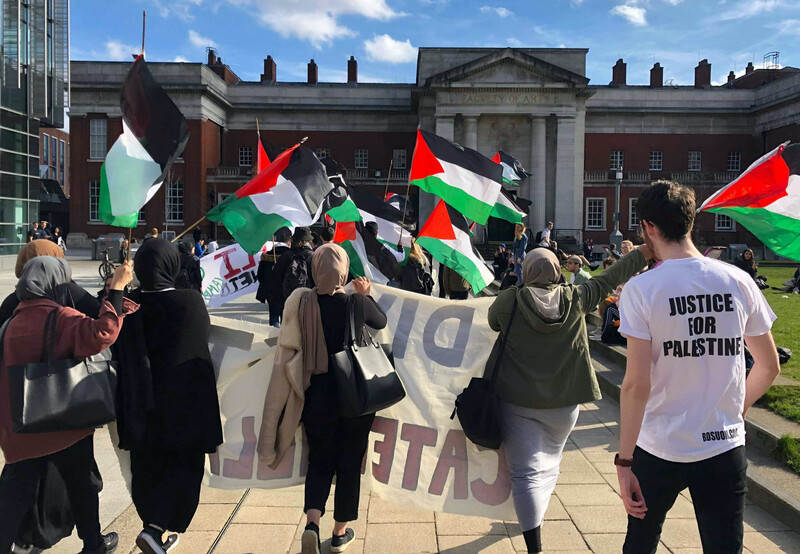Activism and BDS Beat 3 August 2020

Students campaigning for Manchester to divest from Caterpillar in 2018.
The University of Manchester has divested more than $5 million from Caterpillar and the parent company of travel site Booking.com.
Activists on Monday said it was “a colossal win for the Palestine solidarity movement in Britain” and a “watershed moment.”
The university has been a focus for campaigners since 2016 due to its investments in firms complicit in the Israeli occupation of Palestinian land.
Last year students crashed a board meeting to demand divestment from Caterpillar.
Caterpillar supplies bulldozers to the Israeli army which are weaponized to destroy Palestinian homes and carry out extrajudicial killings.
Booking Holdings Inc. is in the United Nations database of companies involved in Israel’s settlements in the occupied West Bank which was published earlier this year.
The parent firm and Booking.com are both on the blacklist due to their listings of rental properties in Israeli settlements built on stolen Palestinian land in violation of international law.
Campaign continues
Data seen by The Electronic Intifada, released by the university in response to freedom of information requests, confirms the divestment took place sometime between April 2019 and 31 March 2020.
In a 23 July 2020 email replying to the request by campaigners, the university’s information officer released its latest investments listing.
She said that the university’s ethical investment guidelines now exclude companies based on a variety of factors, including supply of “controversial weapons.”
In a statement sent immediately after publication of this article, a University of Manchester spokesperson denied that the divestment had any connection to the BDS campaign. “The decisions taken on our specific equity holdings are made by our investment managers with the aim of delivering our overall investment goals,” they said.
But activists are defiant. “The investments in companies upholding Israel’s apartheid regime should have never existed in the first place,” said activist Huda Ammori. “University of Manchester divesting from complicit companies shows the power of the grassroots student movement to hold our institutions to account.”
Ammori founded the BDS campaign at University of Manchester when she was a student there in 2016.
In a statement on Monday activists from Apartheid off Campus, a new student network, said that “The divestment victory at Manchester, the largest university in Europe, is expected to be a watershed moment for the BDS movement on campuses in the UK.”
But activists said they would continue to target Manchester university for BDS campaigns.
According to Apartheid off Campus the university “still has many ties with Israel’s apartheid regime, including its exchange program with the Hebrew University of Jerusalem which sends students to study on occupied and stolen Palestinian land.”
Leeds became the first English university to divest from Israeli apartheid in 2018, when it pulled more than $1.2 million from several firms involved in the arms trade with Israel.
Updated with University of Manchester statement.






Comments
Like Apartheid South Africa,
Permalink dada jitendrananda replied on
Like Apartheid South Africa, the tide will turn for Israel when the reputational and economic cost of imposing Apartheid outweigh the benefits.
Manchester
Permalink Frank Dallas replied on
The university's bland statement is understandable if pusillanimous: they fear the consequences of support for BDS, but without doubt the decision will have been influenced by activism. Students are especially well-placed to lead the campaign and universities vulnerable to serious criticism if they don't disinvest: it's hard to proclaim a commitment to intellectual values, to objectivity, to freedom of thought and expression while helping to fund a regime which gags and brutalises millions. Manchester is a radical city. It has not a single Tory MP. It has a long history of radicalism. Its people are relaxed about ideas of equality. It voted heavily for Corbyn. It will do the same for Starmer but it's important that a left of centre manifesto was popular in the city. Dubbed Shock City in the 19th century because of the gross distinctions of lavish wealth and deathly poverty, the city embraced the need for root and branch reform long ago. Social memory is powerful. Mancunians know their ancestors were exploited and degraded and last year they turned out in numbers to commemorate Peterloo. Manchester is exactly the right place for the campaign against the exploitation and degradation of the Palestinian people to seize the common imagination. The university is part of the city. The people are glad and proud of it; but they believe in justice. They don't like dictators, oppressors and racists. A production of A Raisin In The Sun at the Royal Exchange a few years ago received spontaneous standing ovations. What people were hailing was the play's exposure of the viciousness of racism. While slick-tongued peddlers of falsehood like Margaret Hodge bandy fabricated accusations, Manchester shows the real way to fight racism. The students have something to be proud of and so does the city. Posterity will show them to be right. Now let the movement spread till no UK university invests in the shameful racism of the Israeli State.
The Labour Party and Israel
Permalink Harriet M. Hearst replied on
The only victories against injustice which have brought about any meaningful societal change have been radical. This means facing up to the perpetrators of that injustice. You may not win in the popularity stakes. and aswe saw in the relentless campaign to defeat Corbyn the enemy will do anything to stop you. To put this another way: Keir Starmer would not have been at Waterloo whereas.Jeremy..